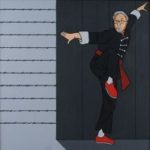As I grow to understand life less and less I grow to love it more and more.— Jules Renard, who died around this date in 1910 Goodgod creative couples: Jimmy Singline Hana Shimada
“I can’t say who’s great or who isn’t. If somebody does achieve greatness it’s only for a minute and anyone is capable of that. Greatness is beyond your control—I think you get it by chance, but it is only for a short time ...
... read more
How many people are left from the year you were born
 “He’d once told me that the art of getting ahead in New York was based on learning how to express dissatisfaction in an interesting way. The air was full of rage and complaint. People had no tolerance for your particular hardship unless you knew how to entertain them with it.”
“He’d once told me that the art of getting ahead in New York was based on learning how to express dissatisfaction in an interesting way. The air was full of rage and complaint. People had no tolerance for your particular hardship unless you knew how to entertain them with it.”
 “He’d once told me that the art of getting ahead in New York was based on learning how to express dissatisfaction in an interesting way. The air was full of rage and complaint. People had no tolerance for your particular hardship unless you knew how to entertain them with it.”
“He’d once told me that the art of getting ahead in New York was based on learning how to express dissatisfaction in an interesting way. The air was full of rage and complaint. People had no tolerance for your particular hardship unless you knew how to entertain them with it.”
Don DeLillo, White Noise
Ten Reasons Why Your Kid Should Get A Music Degree Rather Than Something More “Practical”

Gradually I learned the truth about the working world: except in a few narrow areas of expertise, your undergraduate college major has very little influence on your career path — or your success. On the other hand, a kid with the strong muscles every young musician grows will be able to prosper in life. Following the tough road of a music major will make your daughter more sturdy and flexible than kids who drift through “safe” degree programs.
I could make a catalogue of the people I know who are immune to a gift of mystery of life. What a marvel: a happy human being ... When an interviewer asked Steele, “What do you enjoy most about being a poet?” he replied:

“If a man tells you that he writes, paints, sculpts, or sings for his own amusement, and at the same time makes his work public, then he lies: he lies if he puts his signature to his writing, painting, sculpture or song. He is intent, at the very least, on leaving some shadow of his spirit behind, something to outlive him.”
“Anyone faced with the deadly task of first reading, then writing about, a book he would not ordinarily have read in the first place, is brutally reminded of what he was really born to do: read books that can be felt, from page to page, to do nothing for his wallet but everything for the spirit.”

When Shirley Jackson arrived at the hospital and was asked her occupation, she said “blogger.' The nurse responded, “I’ll just put down housewife" Media Dragons
Why It’s So Difficult For Humans To Live In The Moment

“What best distinguishes our species is an ability that scientists are just beginning to appreciate: We contemplate the future. Our singular foresight created civilization and sustains society. It usually lifts our spirits, but it’s also the source of most depression and anxiety, whether we’re evaluating our own lives or worrying about the nation. Other animals have springtime rituals for educating the young, but only we subject them to ‘commencement’ speeches grandly informing them that today is the first day of the rest of their lives.”

DIVA - Modern Samizdat Playwright and Actress of Hard core ironies
"Read Shakespeare. There's more in Shakespeare about power, decision-making, ambition, and how people are blinded by their own needs that's so incredibly applicable [even today]. To see it in that context is something that makes it real."
Gabbie the most loyal Lover of Shakespeare ...
The Decade Of Rachel Weisz

She almost wasn’t a movie star at all because as a student, she preferred the stage. “After Cambridge, she was confident her life in avant-garde theatre was set to continue, until the acting partner with whom she had set up a theatrical company decided to go to Rada and the thing fell apart.”

“Protest art is not going to stop a bullet, but it does stir the mind and the heart. Artists want to create something pleasing but that also gets a rise out of people. A still life is not going to make you change your voting pattern.” And the artists who create this kind of art often find the ways and the means to keep working, despite the dire circumstances they may find themselves in.
Mary Shelley Predicted The Future With ‘Frankenstein’ – And She Was Utterly Wrong, But That’s Not The Point
Science fiction writer Cory Doctorow: “The fact that a story captures the public imagination doesn’t mean that it will come true in the future, but it tells you something about the present. You learn something about the world when a vision of the future becomes a subject of controversy or delight.”

MUSO
A passionate and inspiring vocalist who will evoke emotion
matched with her breathtaking range.
Readers Report: The Wrap-up

The Problem With Beautiful Bookstores Is That Everyone Wants Photos, All Of The Time
At The Last Bookstore in Los Angeles, “Some see it as a special place, one made magical through the presence of books. Some view it as a photo opportunity first, everything else second. We get people blocking thoroughfares to take photos, making access to shelves difficult for both staff and visitors. We should have known that would happen when we created unusual design fixtures for the store, from the tunnel of books on the mezzanine level to the cash wrap made of books.”
How fake are nature documentaries?
What kinds of secrets does the average person admit to keeping?
LIFE IN THE 21ST CENTURY: Anyone who loves clothes can be a designer now
I wish I had read this a long time ago: “In writing epigrams, most poets gain control over their natural tendency to blab,” which is followed by this sentence: “Besides, an epigram permits them to get a gripe off their chests.” As bloat proliferates, short forms look more attractive as a corrective to congenital logorrhea. The author is X.J. Kennedy in “Gists, Piths, and Poison-Pills: The Art of the Epigram” (An Exaltation of Forms: Contemporary Poets Celebrate the Diversity of Their Art, 2002).
I’m no epigrammist – no poet at all – but the lesson is useful and has applications in everything we write, prose or verse. Even bloggers, a gassy, sentimental bunch, can learn to be ruthless with words. Concision encourages logic and wit and discourages blather. Here is A.E. Housman (More Poems, 1936) on the Boer War:
“Here dead lie we because we did not choose
To live and shame the land from which we sprung.
Life, to be sure, is nothing much to lose;
But young men think it is, and we were young.”
Epigrams often come barbed in their final line. They resemble jokes more than sonnets, and permit no flab. Here is “Avant-garde” by John Frederick Nims (The Powers of Heaven and Earth: New and Selected Poems, 2002), in which the sentiment is admirable but the punch line is at once heavy-handed and diffuse:
“`A dead tradition! Hollow shell!
Outworn, outmoded—time it fell.
Let’s make it new. Rebel! Rebel!’
Said cancer-cell to cancer-cell.”
The master of the epigram in English is J.V. Cunningham. Kennedy elsewhere says of him, “you had to respect a man of his sour integrity,” a quality almost unique to Cunningham, at least since the death of Walter Savage Landor. Here is his “Epigram 23” from the sequence "Epigrams: A Journal" (The Judge is Fury, 1947):
“Dark thoughts are my companions. I have wined
With lewdness and with crudeness, and I find
Love is my enemy, dispassionate hate
Is my redemption though it come too late,
Though I come to it with a broken head
In the cat-house of the dishevelled dead.”
Ours is an age of euphemism and its demented cousin, obscenity. Both modes lie. No wonder readers find Cunningham inhospitable. The harshness of his truth is corrosive. Let Kennedy defend the epigram and, by implication, Cunningham, its most agile practitioner:
“The epigram is brief, closely packed, and single-minded in making its point. Often it is a versified sneer. From that definition, you might think it a mere nasty little bug, deserving only to be stepped on. In fact, some poetry editors hold that view. They are the kind who prefer godawfully serious poems, and mistake length in poetry for importance. Yet when it clicks, an epigram in verse can be memorable, funny—even beautiful, to anyone who can relish the deft placing of words inside tight space.”



